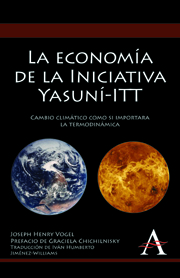Book contents
- Frontmatter
- Contents
- Comentarios del traductor
- Prólogo
- Prefacio
- Introducción
- Agradecimientos
- Abreviaciones y siglas
- Capítulo 1 La termodinámica
- Capítulo 2 La tragedia de los comunes
- Capítulo 3 La ignorancia voluntaria de la realpolitik
- Capítulo 4 La teoría general del segundo mejor
- Capítulo 5 A través del cuello de botella de una economía de vaquero
- Conclusiones
- Apéndice: Filmografia anotada de YouTube
- Notas
- Índice
Capítulo 4 - La teoría general del segundo mejor
Una justificación rigurosa para una propuesta intuitivamente justa
Published online by Cambridge University Press: 05 June 2012
- Frontmatter
- Contents
- Comentarios del traductor
- Prólogo
- Prefacio
- Introducción
- Agradecimientos
- Abreviaciones y siglas
- Capítulo 1 La termodinámica
- Capítulo 2 La tragedia de los comunes
- Capítulo 3 La ignorancia voluntaria de la realpolitik
- Capítulo 4 La teoría general del segundo mejor
- Capítulo 5 A través del cuello de botella de una economía de vaquero
- Conclusiones
- Apéndice: Filmografia anotada de YouTube
- Notas
- Índice
Summary
En 1993 Robert W. Fogel ganó el Premio en Ciencias Económicas en Memoria de Alfred Nobel “por haber renovado la investigación de la historia económica al aplicar la teoría económica y métodos cuantitativos en función de explicar el cambio económico e institucional”. Clio fue la musa de la historia y Fogel aplicó la nueva “cliometría” a los registros de contabilidad de las transacciones de esclavos. En 1974, él y Stanley Engerman publicaron Tiempo en la cruz: la economía esclavista en los Estados Unidos. El análisis refutaba la narrativa popular que daba a entender algo así:
El sistema de esclavos estaba económicamente moribundo;
Soldados de la Unión, animados por la prensa abolicionista, murieron en vano;
Los esclavos habrían sido liberados pronto de todos modos;
La creciente ola de sentimiento pro-abolición en el Norte tenía poco que ver con la secesión de los Estados Confederados del Sur.
A pesar de que la refutación de mitologías es saludable para cualquier democracia, este tipo de análisis también puede ser mal interpretado. Por ejemplo, Fogel y Engerman hacen notar que: “la evidencia que comienza a salir a luz sugiere que el ataque a las condiciones materiales de vida de los negros tras la Guerra Civil no sólo era más feroz, pero en cierto modo, más cruel que la que les precedió”. ¿Era la vida de esclavo mejor que la libertad? La pregunta es tendenciosa e invita a una respuesta afirmativa que a la vez resulta fácil y repugnante.
- Type
- Chapter
- Information
- La economía de la Iniciativa Yasuní-ITTCambio climático como si importara la termodinámica, pp. 47 - 60Publisher: Anthem PressPrint publication year: 2012

